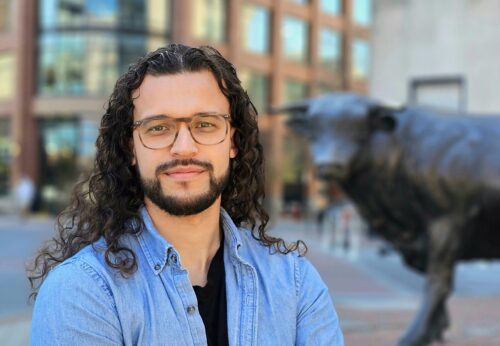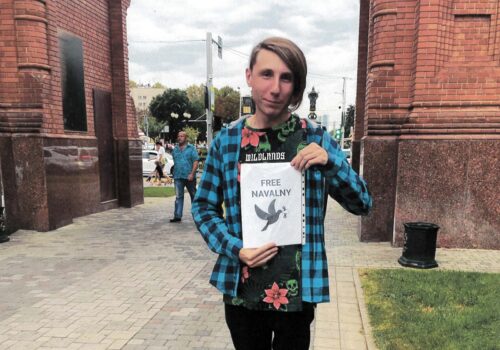Last summer, Kaelyn was at a Latin club in Wilmington, North Carolina when a handsome stranger asked her to dance. She wasn’t in the mood, but the man was just so charming. “If anyone else had asked, I would’ve said no, but Yapa is so genuine,” she says, using his pseudonym to ensure his privacy. At the end of the night, they exchanged numbers; over the following months, they dated and developed a deep friendship. They had no idea that what began with a dance would end in a desperate fight for Yapa’s freedom.
Yapa is an asylum seeker who fled violence in Venezuela in 2022. He attended regular court hearings and had a legal work permit. He drove for a delivery service and hoped to get his commercial trucking license. He was building a life here—one that Kaelyn had become part of.
They spent Thanksgiving together. Yapa played pool with Kaelyn’s dad. Yapa’s sisters started calling Kaelyn “reina”—queen—what Yapa had called her the night they met. In their spare time, they watched the Fast and Furious movies and coached each other through the language barrier, relying on translation apps and Kaelyn’s college Spanish. Every morning, without fail, Yapa would text to ask about her day.
Before she met Yapa, Kaelyn rarely thought about immigration policy. She is originally from Connecticut, and had moved to Wilmington to work in film location scouting. But after President Trump was elected and began to crack down on asylum seekers, she began to worry.
“People would tell me, Oh, you’re overreacting,” she says. “This isn’t 1930s Germany. And I’d say, Yeah, but it’s starting to feel that way. Looking back now, while people were telling me I was being dramatic, I was actually underreacting.”
On February 22, 2025, ICE showed up without warning in the early morning hours while Yapa was headed to work. ICE officers offered no explanation as they handcuffed him. One agent reached into his pocket and took his ID and work permit, documents that have not been seen since. They didn’t tell him where he was going, only that he was being deported—and soon.
Kaelyn was gobsmacked when his sister called to tell her ICE had “abducted” Yapa. He’d been staying with Kaelyn until the previous evening, when he’d moved in with friends. Kaelyn hadn’t wanted him to leave; as a U.S. citizen, she felt better positioned to push back against ICE and help ensure his rights were protected. “I couldn’t explain it, but I was so emotional,” Kaelyn says of their final night together. “And he told me, ‘There’s no reason for them to take me.’” Now, her worst fear had happened. They didn’t know where he was, but they knew they had to act fast to save him.
By then, ICE had already transported Yapa out of state to Georgia’s Stewart Detention Center. It wasn’t until two months later, at his hearing, that ICE first alleged Yapa was part of the Venezuelan gang, Tren de Aragua (TdA). “Shocking is not even the word,” Kaelyn says. “I was shaking.”
In a recent court filing, ICE admitted it has no evidence linking Yapa to any gang. But a ruling from the Trump administration makes it more challenging for immigrants like Yapa who recently entered the country to make a case for release from detention. Now, Yapa faces up to a year behind bars while his fight for asylum continues, with little control over where he’ll be deported to if he loses.
That’s why Kaelyn’s reaction to the TdA allegations was so physical—she knew the accusations could land Yapa in CECOT, the brutal El Salvador prison where the Trump administration has sent many Venezuelan asylum seekers accused of gang affiliations. “I thought, I’m going to have to live the rest of my life knowing he’s in there, and there’s nothing that we can do to get him out of there,” she says. The reality that he—and so many other innocent men—could be locked away in what many have called a modern day concentration camp is an “atrocity,” she says.
All of this has taken a terrible toll on Kaelyn. She’s hired multiple attorneys for Yapa and has gone into debt over legal fees. Meanwhile, Yapa is being held nine hours away from Wilmington and has limited phone access. In April, attorneys with the American Immigration Council and the ACLU took up part of Yapa’s case pro bono; in May, they secured a decision from a judge that says the Trump administration cannot remove Yapa to CECOT or anywhere on the basis of the Alien Enemies Act without a fair chance for him to contest the allegations of TdA membership against him. It’s a relief, but Kaelyn barely recognizes her life these days.
Every time she talks to her sister, they mostly discuss updates on Yapa’s case and the latest immigration news. “We can’t be happy when there’s literally a member of our family who’s been taken from us,” she says. “I’ll never let this go. The administration thinks they’re sowing fear—but they’re creating activists. You can’t destroy someone’s life and expect us to stay quiet.”




